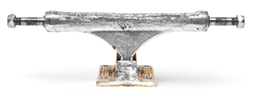
Southbank Reunion 2023. Photo: Wig Worland.
Whilst stood outside of Shoreditch’s overflowing Pure Evil Gallery on the London Calling launch evening in late August, Nick ‘Zorlac’ Orecchio summed up the jubilation of many present with a single sentence: “To my generation, this is the like The Beatles have just gotten back together”.
To those who first became infatuated with skateboarding during the original explosion of the late 1970s, seeing the likes of Jeremy Henderson, John Sablosky, Marc Sinclair, Alex Turnbull, Kadir Guirey, Ben Liddell and Simon Napper reunited again after decades away from the skateboard media spotlight would have previously been the stuff of middle-aged daydreams. These were the bona fide idols of U.K. skateboarding’s critical late 1970s incarnation, a phenomenon which caught the whole nation off guard in 1976 and ended as suddenly as it began, barely 36 months later. For those three whirlwind years, a whole industry boomed, skateparks were constructed, unassuming teenagers were catapulted into the global limelight, and through the collective efforts of a small band of devoted photographers, timeless legacies were unknowingly forged.
When the often discussed but impossible to imagine great extinction level event struck at the end of the decade, skateboarding appeared to follow the ‘flash in the pan’ trend that was apocalyptically prophesied and facilitated by the tabloids. Skateboards nationwide were condemned to dark corners of garages, skateparks were torn down, and the skaters who had garnered international admiration largely vanished from public view, seemingly absorbed and obscured by the onsetting mists of adulthood. Skateboarding’s heartbeat was nigh on impossible to detect throughout the early years of the 1980s, and as the community was rebuilt following the successes of Back to the Future (1985) and Police Academy 4 (1987), it brought with it new directions, new trends, and new heroes to worship.
In the U.K., the two eras were linked by - quite literally - a handful of people, though without the groundwork that was laid during the initial boom of the 1970s, when skateboarding returned with a Michael J. Fox instigated vengeance in the mid-to-late 1980s, the landscape, both as a culture and as an industry, would have looked very different indeed.
I found the exhibition fascinating. It took me right back to me first experiences of things like the smell of urethane, and the feeling of a wonderful new world opening up...
London Calling exhibition opening at Pure Evil Gallery. Photos: Matt Law.
...I'd almost forgotten, but the exhibition brought it all back. - Tim Leighton-Boyce
The difference between the pioneers of U.K. skateboarding in the 1970s, and those who paved the way a decade later, is that those who rose to prominence in the 1980s were able to learn from what had gone before, and as a result, they managed to construct a scene that has only gone from strength to strength since. Be it through injuries or the pressures of life in general, many notable names from the 1980s have naturally dropped off the skateboarding radar over the years, but in attendance across the London Calling weekend were the likes of Sean Goff, Pete Dossett, Paul ‘Jim the Skin’ Atkins, Felix Owusu-Kwarteng, skateboarders from all over the country who are as present at skate events in 2023 as they were four decades previous. The scene has undoubtedly peaked and troughed since the worldwide resuscitation of the 1980s, but such a catastrophic low as that which was experienced at the end of the 1970s has thankfully never returned. Whilst the steadfast skateboarders who owned the spotlight of the 1980s have gone on to enjoy the development of veterans comps, and helped bring about a removal of the social stigma once attached to being an older skateboarder, the pathfinders of the 1970s were simply too early in the game to be awarded such opportunities. For them, as the 1980s were ushered in, skateboarding was largely confined to the past, ostensibly never to return, and real life carried them all forwards into new careers, paving new paths, which more often than not made little mention of their previous four-wheeled forays. So when London Calling sprang into life at the very start of 2023 - an evolution of Steve Douglas’ annual summertime pub crawl through central London - interest was internationally piqued. It had a name and an ethos, and a crew behind it who could undoubtedly make incredible things happen - namely Steve Douglas, Don Brown, Bod Boyle, Dan Adams, Jürgen Blümlein, Neil Macdonald and Iain Borden - but what would it entail, exactly? Who else would be involved? How would this ‘celebration of 1970s skateboarding’ unfold? An event of this kind was unprecedented, especially in the U.K., but as soon as the names started to be confirmed, it became evident that those behind the scenes were achieving the previously unthinkable. After four solid decades of life away from the skateboarding spotlight, those earliest pioneers were finally being brought back together, to relive memories, share stories, and to receive the thanks and praise they deserve for everything that they achieved, directly from the skaters who admired - and still do, evidently, admire - them. As was clear from the rapturous reception they received during the sold out 70s Skate Forum at UCL’s Gower Street campus on the Friday afternoon, simply having these skateboarders occupying the same stage, to hear the legendary tales in person and to give thanks face-to-face was a moment to be cherished. It was a once in a lifetime opportunity for skateboarders spanning several eras to show appreciation personally to the handful of people that made everything for the following generations possible, whether they knew it at the time - or even considered it afterwards - or not.
70s Skate Forum at UCL. Photos: Rob Whiston.
The 70s Skate Forum consisted of two halves: the first was the crew mentioned above being joined by Southport’s Sheenagh Burdell, and via Zoom from Bali, the always enigmatic Mark Baker (amusingly with Steve Olson in tow), discussing topics such as the discovery of Southbank, the merits and pitfalls of early skatepark construction, the photography of Tim Leighton-Boyce, the emergence of the London Skates Dominates attitude, and the formation and rapid rise of U.K. brand Benjyboard. The second half was largely focused upon the shooting and subsequent release of James Cassimus and Brian Gillogly’s legendary September 1979 SkateBoarder Magazine interview with Jeremy Henderson and Marc Sinclair - shot in a handful of hours whilst hiding from the London rain at Rolling Thunder - with some Transatlantic contribution to highlight the American influence on the U.K. scene of the day. There were laughs, cheers and damp eyes throughout, though it was an emotional Sean Goff who took to the mic and perfectly articulated why the largely taken-aback crew on stage were receiving the waves of thunderous applause that they were repeatedly faced with: “Without you guys, I don’t think I’d have had a professional career in skateboarding, and without you guys I wouldn’t have the life I’ve got, and likewise for everyone else. I’ve had an amazing life because of the impact that you guys and girls made on us. So thank you very much.”
Southbank Reunion 2023. Photos: Ben Powell.
Though it will be sadly long gone by the time these words reach printed paper, the London Calling exhibition at Pure Evil Gallery in Shoreditch provided the perfect starting point to the weekends proceedings, and understandably became a site that many would visit on numerous occasions before it was eventually dismantled on September 10th. Expertly intertwining both famous and recently unearthed imagery, with miraculously surviving artefacts and loops of attentively rescanned film footage also on display, the two rooms were nothing short of a treasure trove of 1970s skateboarding, serving as a window into a time where skateparks were built in World War 2 bomb craters, skateboards we predominantly crafted in family sheds, and progress on four wheels was a much higher priority than ardent documentation. It stands to reason, therefore, that for the exhibition’s hugely anticipated opening night, skateboarders as young as, say, Diggs English, were effectively present for what transpired to be Marc Sinclair’s 60th birthday celebrations, cake and all. Alex Turnbull took to the decks at an afterparty which wound up in the early hours of Friday morning; with that in mind, it’s surprising that anyone at all was present, correct and ready to be quizzed at UCL for the 70s Skate Forum a few hours later…

Jeremy Henderson - frontside grind at Crystal Palace. Photo: Iain Borden.

Sean Goff - barefoot grind at Crystal Palace. Photo: Owen Tozer.
Despite the arranged meet ups and a fortuitous crossing of paths with Devo at Hammersmith on the Saturday evening, London Calling wasn’t entirely an occasion geared towards simply immortalising the Elder Days. The planned Southbank skate session on the Saturday afternoon, and the Crystal Palace skatepark takeover on the Sunday, ensured that those with the desire to roll urethane on the capital city’s concrete would more than have their needs met. These were open jams during which skaters from any era could join in, and demonstrate the journey that U.K skateboarding has undergone over these last five decades, as a direct result of the groundwork laid by the aforementioned pioneers. The afternoon long session saw Jeremy Henderson, Sean Goff, Felix Owusu-Kwarteng, Jim the Skin and more dominating the Crystal Palace bowl, whilst over on the other side of the park, a full speed slalom session transported all onlookers and participants back to the heady days of the late 1970s.

Sean Goff - frontside smith grind at Crystal Palace. Photo: Iain Borden.

Don Brown - slalom charge at Crystal Palace. Photo: Iain Borden.
As the South London afternoon gave way to early evening, there were moments of reflection, and conversations covering the London Calling festivities inevitably took place. Bod, Steve and the rest of the organisers were eager to know what the highlights had been, and what the main takeaways were, for the skaters of the wildly differing age groups who were present. The main ambition of the event was to say ‘thank you' to the largely unsung U.K. innovators of the 1970s, and this was something that London Calling achieved with aplomb. Between the exhibition, the 70s Skate Forum and the amazing London Calling zine - which was thoughtfully pieced together by Neil Macdonald and Dan Adams - extraordinary tales from the birth of our culture were finally able to be told, presented alongside a wealth of archive photography and other assorted artefacts that may have otherwise been left to languish in lofts, basements, filing cabinets, unaware of their rightful place in the story of U.K. skateboarding. As our linear experience of time moves us further away from the closing years of the 1970s, it has become crucial to conserve the stories of the era, to ensure the surviving photos and footage are both available and accessible, and - more pressingly - to give thanks to the people who made everything that has unfolded in the intervening decades possible.
Crystal Palace. Photos: Owen Tozer and Iain Borden.
As the saying goes, you can’t really understand where you are going until you know where you have been, and it’s safe to say that London Calling illuminated the origins of our collective journey like nothing that has come before.
Follow London Calling - @london.calling.skateboardinguk




































































